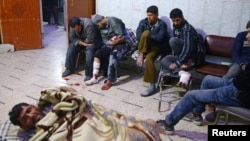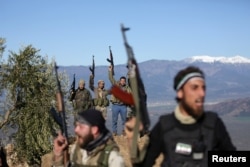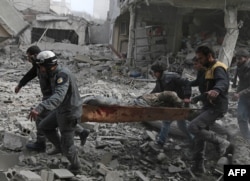A Syrian war monitor says pro-government strikes Tuesday in the rebel-held Damascus suburb of eastern Ghouta have killed more than 100 people.
The Britain-based Syrian Observatory for Human Rights said at least 250 people have been killed since late Sunday, the highest 48-hour death toll in the Syria conflict since a 2013 chemical attack on the suburb.
Tuesday, Turkish troops forced pro-Syrian government troops to retreat as they were en route to Syria's Afrin region, a Kurdish area where Turkish troops have mounted a monthlong offensive.
Syria's state media televised a convoy of about 20 machine gun-armed vehicles entering Afrin from the village of Nubul.
The deployment came one day after Turkey warned the Syrian government not to enter the area, saying it would retaliate if troops tried to protect Kurdish fighters.
Turkey launched its offense Jan. 20 to rid the area of Kurdish forces. Turkey considers Kurdish fighters as terrorists because of their association with outlawed Kurdish rebels fighting inside Turkey.
In Washington, the State Department said U.S. knowledge of what's going on in Afrin is "somewhat limited" because American forces are not there.
But the U.S. joined the international community to voice deep concerns about the increasing violence in eastern Ghouta.
"The escalation has exacerbated the already grave human suffering," spokesperson Heather Nauert said Tuesday. "It also increases the number of individuals who require urgent medical evacuation, which already stood at approximately 1,000."
The U.S. said Russia should be held accountable for its support of Syrian President Bashar al-Assad's regime.
"Russia bears a unique responsibility for the suffering and the plight of the Syrian people," Nauert said.
'Out of control'
Panos Moumtzis, the United Nations' regional humanitarian coordinator for the Syrian crisis, said in a statement late Monday that the humanitarian situation is "spiraling out of control."
"The recent escalation of violence compounds an already precarious humanitarian situation for the 393,000 residents of East Ghouta, many of them internally displaced, and which account for 94 percent of all Syrians living under besiegement today," Moumtzis said.
The Observatory said Assad's forces were using the airstrikes to prepare for a ground offensive to retake control of eastern Ghouta.
Stephen Zunes, political science professor and chair of Middle East Studies at the University of San Francisco, told VOA that given how long opposition fighters have controlled the area, there is likely to be fierce resistance, and the fighting could last months.
"In many ways, we're going to see a situation similar to Aleppo, unfortunately, where the government forces certainly had the upper hand in terms of weaponry, but they'll have to retake the area block by block," Zunes said.
Rebels held Aleppo for about four years before pro-government forces pounded the city with heavy airstrikes and shelling over the course of several months, reclaiming full control at the end of 2016.
VOA's Nike Ching contributed to this report.







